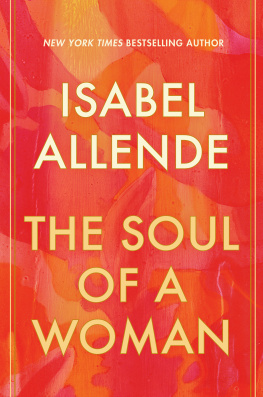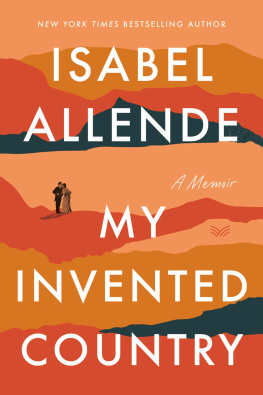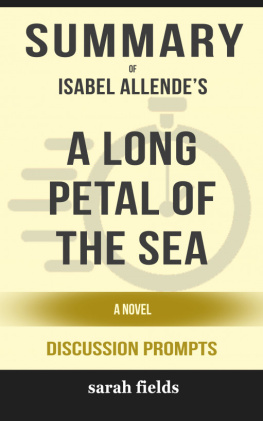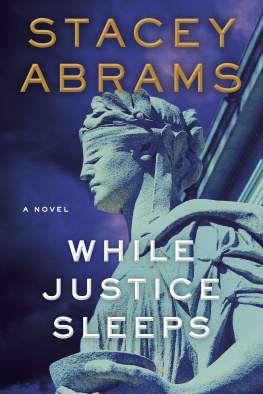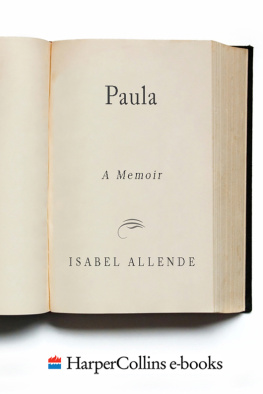Isabel Allende - The Soul of a Woman
Here you can read online Isabel Allende - The Soul of a Woman full text of the book (entire story) in english for free. Download pdf and epub, get meaning, cover and reviews about this ebook. year: 2021, publisher: Random House Publishing Group, genre: Detective and thriller. Description of the work, (preface) as well as reviews are available. Best literature library LitArk.com created for fans of good reading and offers a wide selection of genres:
Romance novel
Science fiction
Adventure
Detective
Science
History
Home and family
Prose
Art
Politics
Computer
Non-fiction
Religion
Business
Children
Humor
Choose a favorite category and find really read worthwhile books. Enjoy immersion in the world of imagination, feel the emotions of the characters or learn something new for yourself, make an fascinating discovery.
- Book:The Soul of a Woman
- Author:
- Publisher:Random House Publishing Group
- Genre:
- Year:2021
- Rating:3 / 5
- Favourites:Add to favourites
- Your mark:
- 60
- 1
- 2
- 3
- 4
- 5
The Soul of a Woman: summary, description and annotation
We offer to read an annotation, description, summary or preface (depends on what the author of the book "The Soul of a Woman" wrote himself). If you haven't found the necessary information about the book — write in the comments, we will try to find it.
The Soul of a Woman — read online for free the complete book (whole text) full work
Below is the text of the book, divided by pages. System saving the place of the last page read, allows you to conveniently read the book "The Soul of a Woman" online for free, without having to search again every time where you left off. Put a bookmark, and you can go to the page where you finished reading at any time.
Font size:
Interval:
Bookmark:
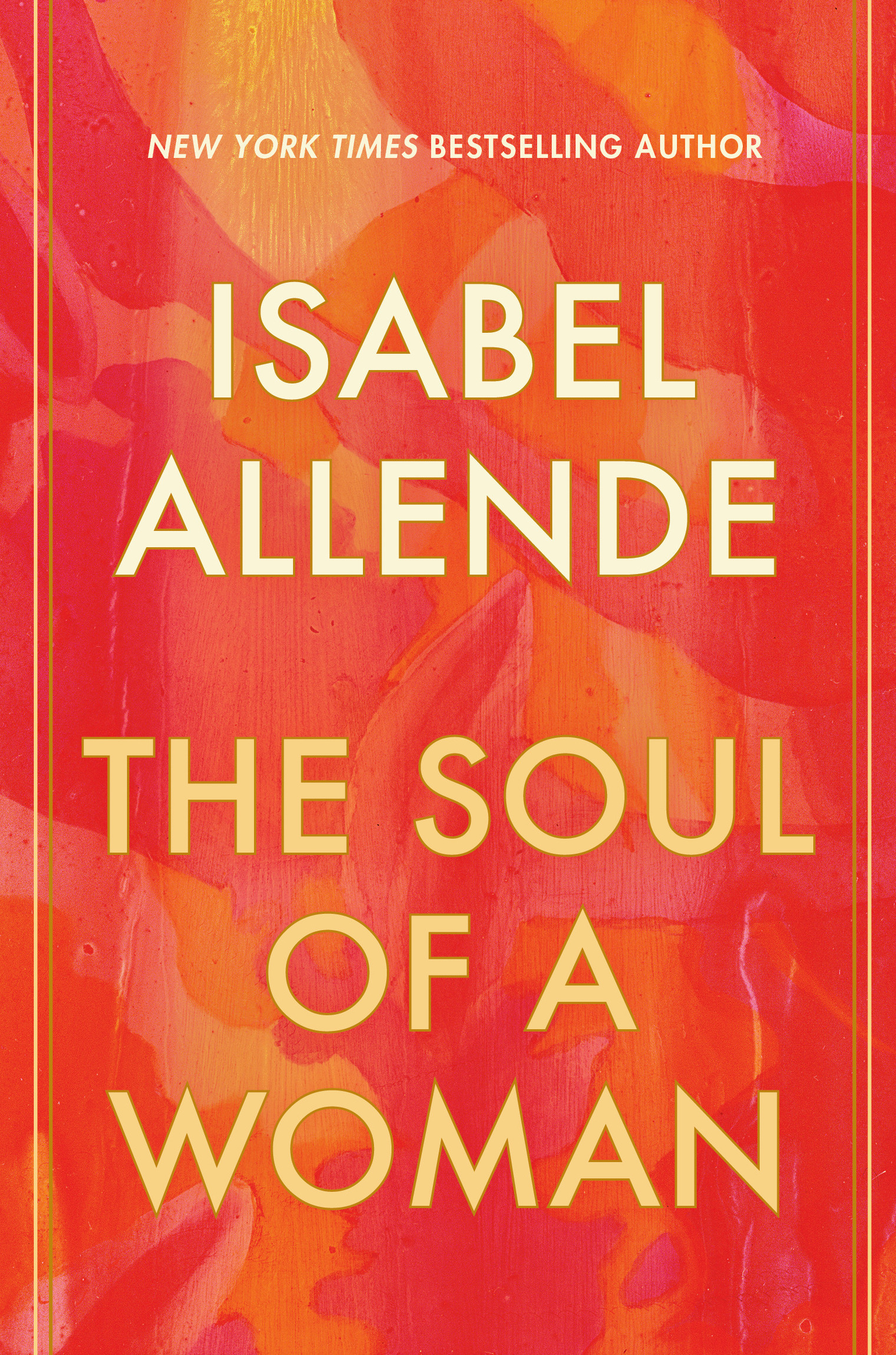

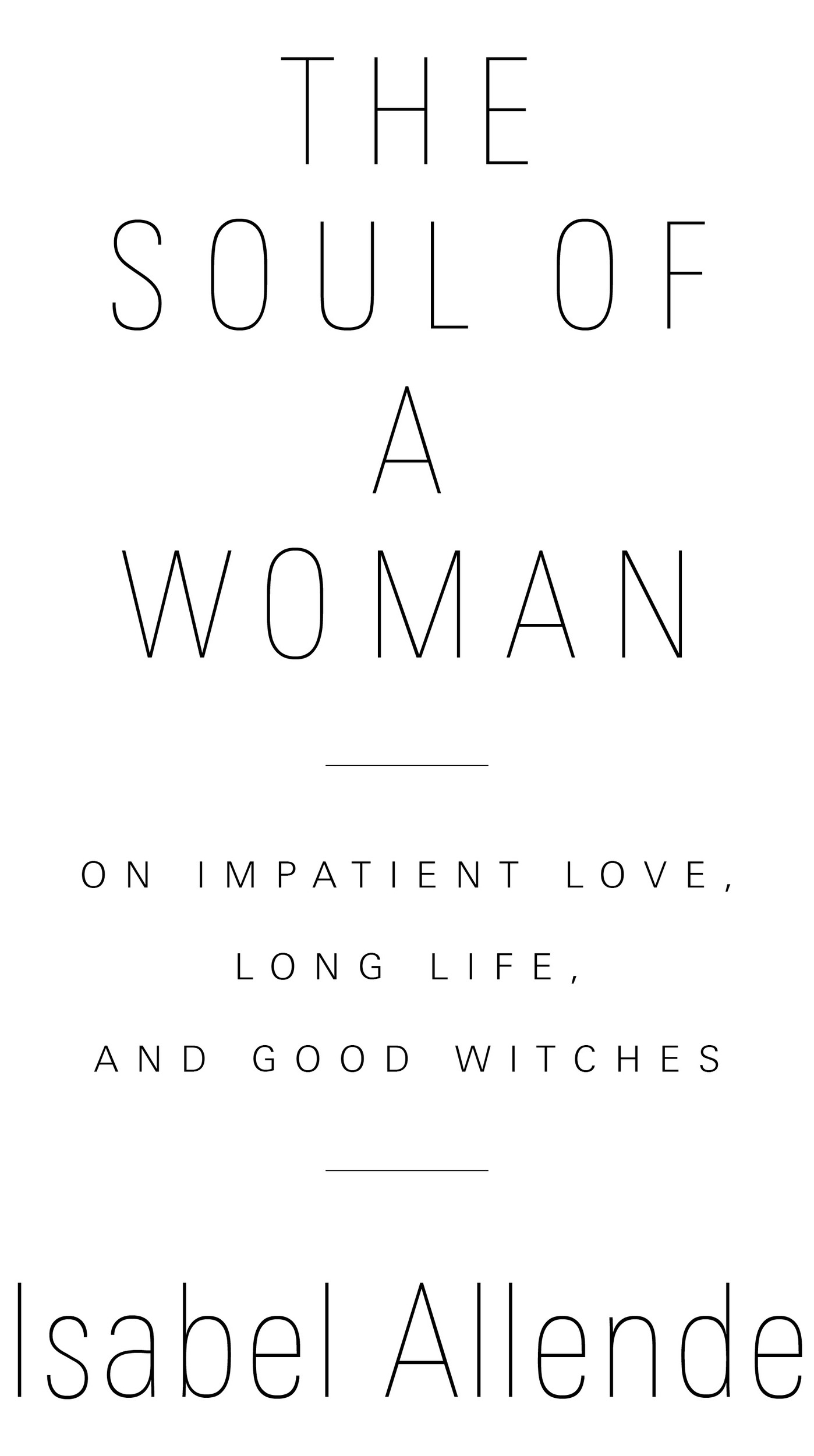
As of the time of initial publication, the URLs displayed in this book link or refer to existing websites on the Internet. Penguin Random House LLC is not responsible for, and should not be deemed to endorse or recommend, any website other than its own or any content available on the Internet (including without limitation at any website, blog page, information page) that is not created by Penguin Random House.
The Soul of a Woman is a work of nonfiction. Some names and identifying details have been changed and any resulting resemblance to persons living or dead is entirely coincidental and unintentional.
English language translation 2021 by Isabel Allende
All rights reserved.
Published in the United States by Ballantine Books, an imprint of Random House, a division of Penguin Random House LLC, New York.
Ballantine and the House colophon are registered trademarks of Penguin Random House LLC.
Originally published in Spanish in Spain as Mujeres del alma ma: Sobre el amor impaciente, la vida larga y las brujas buenas by Penguin Random House Grupo Editorial, S.A., Barcelona in 2020, copyright 2020 by Isabel Allende.
Grateful acknowledgment is made to the following for permission to reprint previously published material:
Heidi Fischbach: Excerpt from English translation of Volver a los 17 by Violeta Parra, translated by Heidi Fischbach. Reprinted by permission of Heidi Fischbach.
Penguin Random House Grupo Editorial: Poem Arde from Ahora que ya bailas by Miguel Gane, copyright 2018 by Miguel Gane. Published originally in Spanish by Penguin Random House Grupo Editorial. Translated into English as Burn by Isabel Allende. Translated by permission of Penguin Random House Grupo Editorial.
Rocking Chair Books Ltd: Excerpt from Home by Warsan Shire, copyright 2014. Reprinted by permission of the author.
Shearsman Books Ltd: Excerpt from the English translation of You Foolish Man by Juana Ines de la Cruz, translated by Michael Smith, copyright 2005 by Michael Smith. Reprinted by permission of the Estate of Michael Smith and Shearsman Books.
Hardback ISBN9780593355626
Ebook ISBN9780593355633
randomhousebooks.com
Book design by Barbara M. Bachman, adapted for ebook
Cover design: Elena Giavaldi
Cover image: Charlotte Johnstone / Bridgeman Images
ep_prh_5.6.1_c0_r0
W hen I say that I was a feminist in kindergarten, even before the concept was known in my family, I am not exaggerating. I was born in 1942, so we are talking remote antiquity. I believe that the situation of my mother, Panchita, triggered my rebellion against male authority. Her husband abandoned her in Peru with two toddlers in diapers and a newborn baby. Panchita was forced to return to her parents home in Chile, where I spent the first years of my childhood.
My grandparents house in Santiago, in the Providencia neighborhood, then a residential district and now a labyrinth of offices and shops, was large and ugly, a monstrosity of cement with high ceilings, drafts, walls darkened by kerosene-heater soot, heavy red plush curtains, Spanish furniture made to last a century, horrendous portraits of dead relatives, and piles of dusty books. The front of the house was stately. Someone had tried to give the living room, the library, and the dining room an elegant varnish, but they were seldom used. The rest of the house was the messy kingdom of my grandmother, the children (my brothers and me), the maids, and two or three dogs of no discernible breed. There was also a family of semi-wild cats that reproduced uncontrollably behind the refrigerator; the cook would drown the kittens in a pail on the patio.
All joy and light disappeared from the house after my grandmothers premature death. I remember my childhood as a time of fear and darkness. What did I fear? That my mother would die and we would be sent to an orphanage, that I would be kidnapped by pirates, that the Devil would appear in the mirrorswell, you get the idea. I am grateful to that unhappy childhood because it provided ample material for my writing. I dont know how novelists with happy childhoods in normal homes manage.
Early on, I realized that my mother was at a disadvantage compared to the men in her family. She had married against her parents wishes and the relationship had failed, just as she had been warned it would. Shed had to annul her marriage, which was the only way out in that country, as divorce was not legalized until 2004. Panchita was not trained to work, she had no money or freedom, and she was the target of gossip; not only was she separated from her husband, but she was also young, beautiful, and coquettish.
My anger against machismo started in those childhood years of seeing my mother and the housemaids as victims. They were subordinate and had no resources or voicemy mother because she had challenged convention and the maids because they were poor. Of course, back then I didnt understand any of this; I was only able to do so in my fifties after spending some time in therapy. However, even if I couldnt reason, my feelings of frustration were so powerful that they marked me forever; I became obsessed with justice and developed a visceral reaction to male chauvinism. This resentment was an aberration in my family, which considered itself intellectual and modern but according to todays standards was frankly Paleolithic.
Panchita consulted several doctors trying to find out what was wrong with me; maybe her daughter suffered from colic or a tapeworm? An obstinate and defiant character was accepted in my brothers as an essential condition of masculinity, but in me it could only be pathological. Isnt it always thus? Girls are denied the right to be angry and to thrash about. We had some psychologists in Chile, maybe even child psychologists, but in a time dominated by taboos, they were the last resource for the incurably mad. In my family, our lunatics were endured in private. My mother begged me to be more discreet. I dont know where you got those ideas. You will acquire a reputation of being butch, she told me once, without explaining what that word meant.
She had good reason to worry about me. I was expelled from schoolrun by German Catholic nunsat age six, accused of insubordination; it was a prelude to my future. Maybe the real reason I was expelled was that Panchita was a single mother with three kids. That should not have shocked the nuns, because many children in Chile were born out of wedlock, but not usually in our social class.
For decades I considered my mother a victim, but I have learned that the definition of victim is someone who has no control or power over her or his circumstances. I dont think that was her case. Its true that in my early childhood my mother seemed trapped, vulnerable, and sometimes desperate, but her situation changed later, when she met my stepfather and started traveling. She could have fought for more independence and the life she wanted; she could have developed her great potential instead of submitting. But I know thats easy for me to say because I belong to the feminist generation. I had opportunities that she didnt have.
Font size:
Interval:
Bookmark:
Similar books «The Soul of a Woman»
Look at similar books to The Soul of a Woman. We have selected literature similar in name and meaning in the hope of providing readers with more options to find new, interesting, not yet read works.
Discussion, reviews of the book The Soul of a Woman and just readers' own opinions. Leave your comments, write what you think about the work, its meaning or the main characters. Specify what exactly you liked and what you didn't like, and why you think so.

